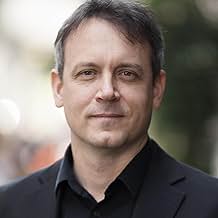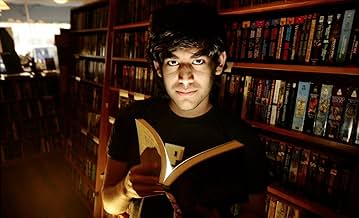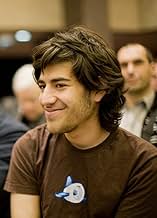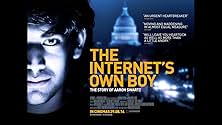The Internet's Own Boy - Die Geschichte des Aaron Swartz
Originaltitel: The Internet's Own Boy: The Story of Aaron Swartz
IMDb-BEWERTUNG
8,0/10
18.365
IHRE BEWERTUNG
Die Geschichte des Programmierwunderkindes und Informationsaktivisten Aaron Swartz, der sich im Alter von 26 Jahren das Leben nahm.Die Geschichte des Programmierwunderkindes und Informationsaktivisten Aaron Swartz, der sich im Alter von 26 Jahren das Leben nahm.Die Geschichte des Programmierwunderkindes und Informationsaktivisten Aaron Swartz, der sich im Alter von 26 Jahren das Leben nahm.
- Regie
- Drehbuch
- Hauptbesetzung
- Auszeichnungen
- 4 Gewinne & 4 Nominierungen insgesamt
Aaron Swartz
- Self
- (Archivfilmmaterial)
Stephen Heymann
- Self - Asst. U.S. Attorney Massachusetts
- (Archivfilmmaterial)
Empfohlene Bewertungen
This is a very good documentary of a subject that EVERYONE should be interested in. If you're interested in the Internet, technology, open publishing (science or law), or freedom, you MUST watch this documentary. It's a moving and disturbing story of a very important young man, and how the government tried to make an example out of him.
Where it fails, is dealing with Aaron's mental health issues. His struggles with depression (which he documented in his blog) were glossed over, and even dismissed (such as when he brother said he didn't remember any mood swings as a child). I think this was purposefully done to fit the thesis of the documentary (that the prosecution backed him into a corner), and ignores a major part of Aaron's life. Just because he was "at-risk" due to mental illness, doesn't mean he wasn't targeted and persecuted. Instead, his depression was swept under the rug by the filmmaker, as it so often is in our society.
Overall, this is a very important film and I would highly recommend it. However, read Aaron's blogs and writings for supplemental info!
Where it fails, is dealing with Aaron's mental health issues. His struggles with depression (which he documented in his blog) were glossed over, and even dismissed (such as when he brother said he didn't remember any mood swings as a child). I think this was purposefully done to fit the thesis of the documentary (that the prosecution backed him into a corner), and ignores a major part of Aaron's life. Just because he was "at-risk" due to mental illness, doesn't mean he wasn't targeted and persecuted. Instead, his depression was swept under the rug by the filmmaker, as it so often is in our society.
Overall, this is a very important film and I would highly recommend it. However, read Aaron's blogs and writings for supplemental info!
The Internet's Own Boy was very well-received at its showing in Austin's SXSW Film Festival. The film is simultaneously a biography of the tragic death of internet pioneer Aaron Swartz and at the same time a fascinating history of the development of the online political movements that he devoted his life to. The film tells a fascinating story of young genius deeply involved in the early development of the internet including co-founding of Reddit. His genius is unquestionable. The film really provides a tribute to a talented young man and presents a strong case that he was unjustly and selectively prosecuted and overcharged by an overzealous prosecutor. This prosecution seems to have provoked his suicide.
But the film is unable to establish any real emotional distance from its subject in order to present an objective full picture of Aaron. Early scenes show home movie pictures of Aaron as an adorable precocious toddler playing with his brothers. From this beginning it is impossible to establish the emotional independence necessary to shine any sort of critical light on Aaron's life or activities. The interviews are all with his family, friends and supporters and don't really critique his efforts. He becomes a victim who despite his incredible genius seems to lose responsibility for his own actions including his own suicide. He becomes purely a victim of government persecution with no real responsibility for his own life decisions including his various hacking activities that ultimately lead to his arrest.
The film really presents Aaron Swartz as a modern-day martyr for the cause of an open access to the internet that he deeply believed in and dedicated himself to. Perhaps because of his recent and tragic death the filmmaker seems unwilling to question the ethics of Aaron's hacker-like tactics. There really aren't any voices raising serious questions about whether his efforts to take the law into his own hands by downloading millions of documents was truly an appropriate form of civil disobedience. He did, in fact, steal millions of articles and violate intellectual property rights through his actions. He undoubtedly believed that what he was doing was right and just.
The film is thus more of a tribute to his life and a critique of the criminal justice system than it is a balanced examination of his controversial history which deserves closer examination. The filmmaker seems to be too close to Aaron's legacy to present a truly objective self-critical examination of his legacy and his somewhat radical view of open access to knowledge and information. While it is easy to argue for that view, it overlooks the complexity of case for protecting intellectual property rights.
Ironically, Aaron seems more far impressive and righteous when he is fighting successfully to defeat the SOPA bill than when he is stealing copyrighted materials. This showed his remarkable ability to organize online and unify people in a collective action that made a real difference for the future of the internet. The tragedy is that this great young activist self-destructed. The filmmaker turns his heroism into victimization and I think may actually undermine his own effort to pay tribute to Aaron. The best tributes are those that are present a complete picture rather than build-up a myth. Never-the-less, despite its flaws this is a powerful and important film that is highly recommended to begin to understand who Aaron Swartz was and to learn about the important issues of intellectual freedom online that he devoted himself to.
But the film is unable to establish any real emotional distance from its subject in order to present an objective full picture of Aaron. Early scenes show home movie pictures of Aaron as an adorable precocious toddler playing with his brothers. From this beginning it is impossible to establish the emotional independence necessary to shine any sort of critical light on Aaron's life or activities. The interviews are all with his family, friends and supporters and don't really critique his efforts. He becomes a victim who despite his incredible genius seems to lose responsibility for his own actions including his own suicide. He becomes purely a victim of government persecution with no real responsibility for his own life decisions including his various hacking activities that ultimately lead to his arrest.
The film really presents Aaron Swartz as a modern-day martyr for the cause of an open access to the internet that he deeply believed in and dedicated himself to. Perhaps because of his recent and tragic death the filmmaker seems unwilling to question the ethics of Aaron's hacker-like tactics. There really aren't any voices raising serious questions about whether his efforts to take the law into his own hands by downloading millions of documents was truly an appropriate form of civil disobedience. He did, in fact, steal millions of articles and violate intellectual property rights through his actions. He undoubtedly believed that what he was doing was right and just.
The film is thus more of a tribute to his life and a critique of the criminal justice system than it is a balanced examination of his controversial history which deserves closer examination. The filmmaker seems to be too close to Aaron's legacy to present a truly objective self-critical examination of his legacy and his somewhat radical view of open access to knowledge and information. While it is easy to argue for that view, it overlooks the complexity of case for protecting intellectual property rights.
Ironically, Aaron seems more far impressive and righteous when he is fighting successfully to defeat the SOPA bill than when he is stealing copyrighted materials. This showed his remarkable ability to organize online and unify people in a collective action that made a real difference for the future of the internet. The tragedy is that this great young activist self-destructed. The filmmaker turns his heroism into victimization and I think may actually undermine his own effort to pay tribute to Aaron. The best tributes are those that are present a complete picture rather than build-up a myth. Never-the-less, despite its flaws this is a powerful and important film that is highly recommended to begin to understand who Aaron Swartz was and to learn about the important issues of intellectual freedom online that he devoted himself to.
When a documentary can illicit tears of both anger and sadness, you know it must be doing something right. Such is the case with The Internet's Own Boy: The Story of Aaron Swartz. Aaron Swartz was one of the co-founders of the internet's so called front page; Reddit. He was also one of the most outspoken and inspired activists fighting to keep the internet free, protecting the rights and privileges of the American people whose government was trying tirelessly to censor the free speech granted by the web. Tragically, he took his own life at the age of 26 due to the constant pressures and endless scrutiny and indictment placed onto him by the American government. This film chronicles his tragically short life and attempts to put Aaron's name out there for the sake of carrying on his legacy. There aren't a whole lot of documentaries or films in general out there that I would say it is crucial that you watch. However, The Internet's Own Boy is one of these films. It pulls back the curtain on one of the most significant and relevant issues of our modern era, which is fighting censorship and maintaining the ability to access and attain the necessities the internet grants us. For instance the film starts out by showing us Swartz's many hacking campaigns where he would obtain legal and court documents from the American courts that one would otherwise have to unfairly pay for, and making it free to the public. It shows Aaron's fight for people's right to information, something the government seems to be stopping at nothing to revoke. It's truly sickening to see the things that Aaron, his friends, and his colleagues are put through in their fight for such a just cause. There are parts of this film that are absolutely infuriating, and there are parts that inspire as much as the other moments enrage. The victorious battle against the SOPA bill, for instance, highlights one great victory that shows off the American people's ability to make change happen, and fight back against what they know is wrong. This film shows what civil disobedience, protest, and the aptly coined term "hacktivism" are capable of, but it also shows the ignorant unfairness of what the government is capable of as well. Hence the frustration. It highlights the absurd idiocracy of a system stuck in the past, one that literally bases its bylaws off of The Computer Fraud and Abuse Act written in the 1980's when computers were a brand new idea and the endless scope of the internet wasn't even a conceived notion yet. The Internet's Own Boy strikes at a lot of issues that so easily get swept under the rug, and urges all of its viewers to be conscious of our rights and whether or not they are being stripped from us, because it can happen right under our noses. It concedes to us that we can't settle for unfair censorship and we must continue to fight back against a system that wants to tie our hands behind our backs and put duct tape over our mouths. Yes, the story of Aaron Swartz is a very sad one, and the film strikes emotional chords that give a beautiful amount of weight to the story being told. But the goal of The Internet's Own Boy is not to sour our moods with the tragic story of one of the 21st century's greatest minds. It is to raise awareness of this war against censorship; a war that can and must be won. The relevance of the issue is too immediate and too vital to our free speech system to be ignored. If you use the internet, you must see The Internet's Own Boy, and you must help carry on Aaron Swartz's noble legacy.
I don't know why the Aaron Swartz story was never on my radar, which is one of the reasons why The Internet's Own Boy was an eye-opener. His is a tragic story, and although the filmmakers secured screen time with (almost) all involved, it's sad that all we have from Swartz is archival webcam interview footage. The movie makes a persuasive case for his being made a high-profile example by the justice system, and there's enough here to leave you either irate or fearful (or both).
Whether or not you agree with the man's politics, he made a difference - hell, he was instrumental in getting SOPA struck down, so he deserves our respect for that - and his story brings to light the need for fine-tuning the ancient copyright laws. Either way, this documentary delivers.
7/10
Whether or not you agree with the man's politics, he made a difference - hell, he was instrumental in getting SOPA struck down, so he deserves our respect for that - and his story brings to light the need for fine-tuning the ancient copyright laws. Either way, this documentary delivers.
7/10
Aaron Swartz was an internet hacker and activist who committed suicide under pressure from a U.S. government attempt to prosecute him for a crime (stealing data) where he meant no harm and sought to make no money. I certainly agree that the legal case against Swartz was absurdly overcooked; but the film throws up a number of interesting issues about theories of government in general, and the techno-utopian world-view that Schwarz subscribed to. Technological advance can make previous ways of doing things obsolete, and measures of control superfluous and/or unnecessary. They threaten vested interests (or, more probably, they threaten to replace an old elite whose interests are vested in the old technology with a new one unencumbered by attachment to the past). One can believe these changes are good in themselves; one can believe the death of the old control structures is an added bonus; one can believe that the changes are good precisely because they lead to the end of the old control structures. And this way of thinking (in the context of technologies for the storage and dissemination of data) leads to the idea that 'data wants to be free'; and that any attempt to restrict data availability is a form of human rights violation. This leads to some strange positions. For example, academic journals have existed, in some cases for hundreds of years, because publication has been intrinsically difficult. Now, it's easier, the traditional model may be obsolete, and of course, the publishers fight changes that threaten to end their cosy oligopoly. And yet, for an academic journal publisher to seek to defend their copyrighted material is not evil (unless one believes in the complete abolition of intellectual property, which is a different kind of argument). Being on the wrong side of history is ultimately a practical matter, not a moral one. And new models of publishing still come at a cost and still have to be paid for - data is not free (in that other sense of freedom) and in a world with differential ability to pay, that means it cannot be universally free in the other sense either.
And as a scientist, supportive of the principle of open access, I find myself in agreement with most of Swartz's positions; and yet alienated by his friends and collaborators, who insist that the government should not have prosecuted Schwarz at all, basically because he was right and they were wrong. One really doesn't need a very advanced theory of power to see that this is a naive way of looking at the world, or an advanced theory of psychology to consider it an arrogant one. The world needs its Aaron Swartz's, and a wise and humane government would not seek to hand down excessive sentences on such people merely to assert its own right to make the rules. But the world also needs people to (mostly) obey the law, and while there may be many decisions of government that people might justly object to on grounds of conscience, Swartz's objections to copyright law lie mainly in the fact that it prevented him from doing cool and interesting things. I find myself in support of most of Swartz's specific views, yet sometimes I feel as scared of libertarians of left (like Swartz) and right as I am of the big government they oppose, whose optimism is invigorating yet in some senses selfish, with their apparent belief that government's worst crime is acting to prevent brilliant and privileged people from reaching the height of their potential. Whatever, it's a documentary that certainly makes you think, but one should screen the views of Scwartz's acolytes before swallowing them in their entirety.
And as a scientist, supportive of the principle of open access, I find myself in agreement with most of Swartz's positions; and yet alienated by his friends and collaborators, who insist that the government should not have prosecuted Schwarz at all, basically because he was right and they were wrong. One really doesn't need a very advanced theory of power to see that this is a naive way of looking at the world, or an advanced theory of psychology to consider it an arrogant one. The world needs its Aaron Swartz's, and a wise and humane government would not seek to hand down excessive sentences on such people merely to assert its own right to make the rules. But the world also needs people to (mostly) obey the law, and while there may be many decisions of government that people might justly object to on grounds of conscience, Swartz's objections to copyright law lie mainly in the fact that it prevented him from doing cool and interesting things. I find myself in support of most of Swartz's specific views, yet sometimes I feel as scared of libertarians of left (like Swartz) and right as I am of the big government they oppose, whose optimism is invigorating yet in some senses selfish, with their apparent belief that government's worst crime is acting to prevent brilliant and privileged people from reaching the height of their potential. Whatever, it's a documentary that certainly makes you think, but one should screen the views of Scwartz's acolytes before swallowing them in their entirety.
Wusstest du schon
- Zitate
First Title Cards: Unjust Laws exist; shall we be content to obey them, or shall we edeavor to amend them, and obey them until we have suceeded, or shall we transgress them at once?- Henry David Thoreau
- VerbindungenFeatures Das zauberhafte Land (1939)
- SoundtracksExtraordinary Machine
Written and Performed by Fiona Apple
Top-Auswahl
Melde dich zum Bewerten an und greife auf die Watchlist für personalisierte Empfehlungen zu.
- How long is The Internet's Own Boy: The Story of Aaron Swartz?Powered by Alexa
Details
- Erscheinungsdatum
- Herkunftsland
- Offizieller Standort
- Sprache
- Auch bekannt als
- Tod eines Internet-Aktivisten - Die Aaron Swartz-Story
- Produktionsfirmen
- Weitere beteiligte Unternehmen bei IMDbPro anzeigen
Box Office
- Bruttoertrag in den USA und Kanada
- 48.911 $
- Eröffnungswochenende in den USA und in Kanada
- 21.705 $
- 29. Juni 2014
- Weltweiter Bruttoertrag
- 48.911 $
- Laufzeit1 Stunde 45 Minuten
- Farbe
- Seitenverhältnis
- 1.78 : 1
Zu dieser Seite beitragen
Bearbeitung vorschlagen oder fehlenden Inhalt hinzufügen

Oberste Lücke
What is the Spanish language plot outline for The Internet's Own Boy - Die Geschichte des Aaron Swartz (2014)?
Antwort

























